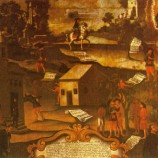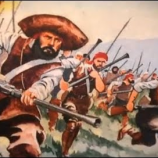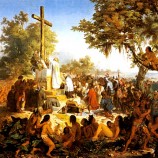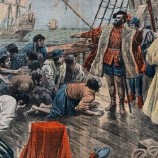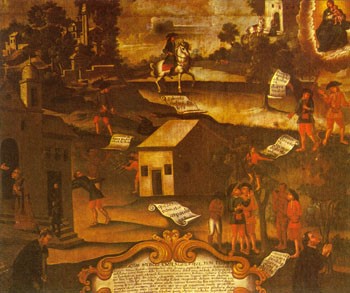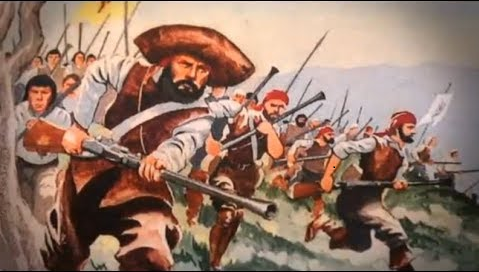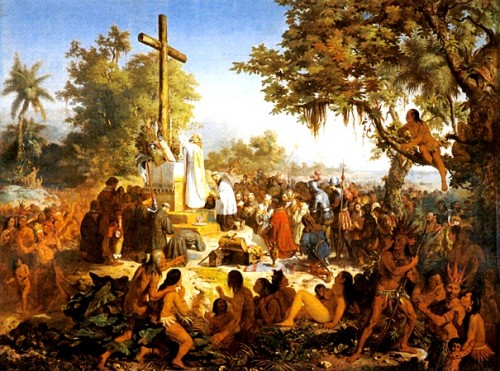Priesthood and Politics – Part 4 – Politics in the Gospels
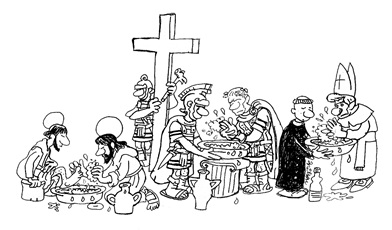
The Gospels teach us that Lord Jesus of Nazareth was condemned to death in a plot contrived by the political, economic and religious powers of his time. During Jesus’ lifetime, the political parties were also religious: the same law organized worship to the one God and the political life of the people. Each party defended a different program according to its interests. Jesus adopted a critical attitude towards the abuse of power exhibited by the ruling classes.
The assessments made by Jesus, according to the Gospel texts, clarify his position regarding those who would use political power to oppress and dominate: “Woe to you lawyers also! For you load men with burdens that are difficult to carry, and you yourselves won’t even lift one finger to help carry those burdens.” (Luke chapter 11,46), Jesus also faced the powerful King Herodes, referring to him as a fox (Luke 13,32). Furthermore, Jesus questioned the legitimacy of the leaders of the Jewish nation: “What therefore will the lord of the vineyard do? He will come and destroy the farmers, and will give the vineyard to others.” (Mark, chapter 12,9). Thus Jesus faced the conflicts created by the political system of the Palestine authorities, unmasking falseness and oppression.
Why did Jesus die? One incontestable cause for diverse scholars and theologians regarding the murder of Jesus is the question of political power. The political and religious leaders of the Jewish people at that time appealed to condemn Jesus to death at the command of Pontius Pilate, legal representative of the Roman Empire, transferring to him the responsibility of Jesus’ judgment and execution. All of the accusations of political subversion against Him were raised.
They presented him to Pilate as a politically dangerous man to the Roman power. They accused: “We found this fellow perverting the nation, and forbidding to give tribute to Caesar, saying that he himself is a Christ-King.” (Luke 23, 2). Those who have faith, Christian and Catholic faith above all, have greater reasons, conditions and instruments to conduct politics from a faithful standpoint. Can we still say that Jesus did not side with a political party? We cannot claim categorically that Jesus was responsive to any political party of his time, but we can affirm with total conviction that Jesus assumed the identity of his mission in the defense of the lives of the poor, marginalized, oppressed and ostracized of his time.
“The Spirit of the Lord God is upon me; because the Lord hath anointed me to preach good tidings unto the meek; he hath sent me to bind up the brokenhearted, to proclaim liberty to the captives, and the opening of the prison to them that are bound; To proclaim the acceptable year of the Lord, and the day of vengeance of our God; to comfort all that mourn; (Luke 4,18; Isaiah 61, 1-2). Therefore to not participate in Politics, with a capital ‘P’–to omit oneself–is the worst way to conduct politics for someone who calls himself a Christian, a follower of Jesus. Popular wisdom says: “The worst politician is the one who sits with his arms crossed.” Politics is one of the best ways to love thy neighbor, because it strives to find solutions at the root level. It is where one has the opportunity to provide a quality service to his populace, especially for the salvation of a less favored citizenship and those who live in social exclusion.
During the 5th Meeting of Priests in Political Parties of Minas Gerais, taken place in Belo Horizonte in 2008, a manifesto that continues current was rewritten and which I adopted as a basis for this text. I transcribe its conclusion: “We are indignantly repulsed by the posture of those who intend to own the people and power, doing what they please without at least listening to others. The problem is not priests participating in politics. The problem is that many priests abandon the world of Faith-Politics.
The engagement of priests in political parties, a controversial issue for many ecclesiastic sectors, probably expresses that which the gospel makes a question of cataloguing about the testimony of Jesus, threatened to death (and to resurrection): “Do not suppose that I have come to bring peace to the earth. I did not come to bring peace, but the sword.” (Matthew 10,34; Luke 12,51). Galileo faced conflicts, took sides with the oppressed and for this he was condemned to death. He was not content with the peace of a cemetery, nor with an apparent unity.
Finally dear reader, whether you vote for priests or not, what we can no longer tolerate is to coexist with unprepared politicians assuming positions as our representatives. Opposing to the process of domination and plundering, we should seek an alternative to change the demagogic model of conducting politics and assume a respectful and responsible stance among our fellow man; moving closer to ethics so as to confront the practices of extortion and corruption which in modern times seem inherent to the human condition, but that in reality employs our lapsed political system.
Permit us, dear God, that the elections of October 2012 raise citizen awareness for the good of the people and society as a whole. That the elected in fact contribute to the construction of a new society. In these times of change, may they grasp the wisdom of good living; that is to say, to open our minds, to know how to live with ourselves, with others and with the plurality and diversity of a society in transformation.
Related Articles







